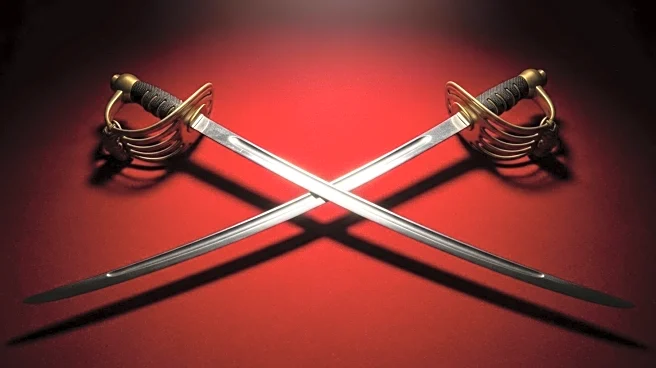What's Happening?
North Korean leader Kim Jong Un is set to make a rare international appearance by attending a military parade in Beijing on September 3, 2025. This event marks the 80th anniversary of the end of World War II and will feature heads of state from 26 countries, including Russian President Vladimir Putin. The United States and its allies have opted to boycott the event, partly due to Putin's presence, who is under an arrest warrant from the International Criminal Court for alleged war crimes in Ukraine. The Chinese government has extended a warm welcome to Kim, emphasizing the historical ties between China and North Korea during World War II. This visit is significant as it will be Kim's first trip to China since before the COVID-19 pandemic, highlighting the complex dynamics between North Korea, China, and Russia.
Why It's Important?
Kim Jong Un's attendance at the Beijing parade underscores the shifting alliances in the region, particularly North Korea's growing ties with China and Russia. This development could have significant implications for international diplomacy and security, especially given North Korea's nuclear ambitions and the strained relations with the West. The absence of Western leaders at the event highlights the geopolitical divide and the potential for increased tensions. For North Korea, strengthening ties with China and Russia could provide economic and military support, crucial for a nation under heavy international sanctions. This move may also signal North Korea's strategic positioning in the face of global power shifts.
What's Next?
The international community will closely monitor any discussions or agreements that may arise from Kim's visit to Beijing. Potential meetings with Chinese President Xi Jinping or Russian President Vladimir Putin could lead to further collaboration between these nations. The U.S. and its allies may respond by reinforcing their diplomatic and military strategies in the region. Additionally, any advancements in North Korea's military capabilities, possibly supported by Russia or China, could prompt a reevaluation of sanctions and diplomatic approaches by the international community.
Beyond the Headlines
This event highlights the broader implications of North Korea's diplomatic maneuvers, which may influence global power dynamics. The strengthening of ties between North Korea, China, and Russia could challenge the existing international order and lead to new alliances. The ethical and legal dimensions of engaging with nations under international scrutiny, such as Russia and North Korea, will continue to be a point of contention in global diplomacy.











